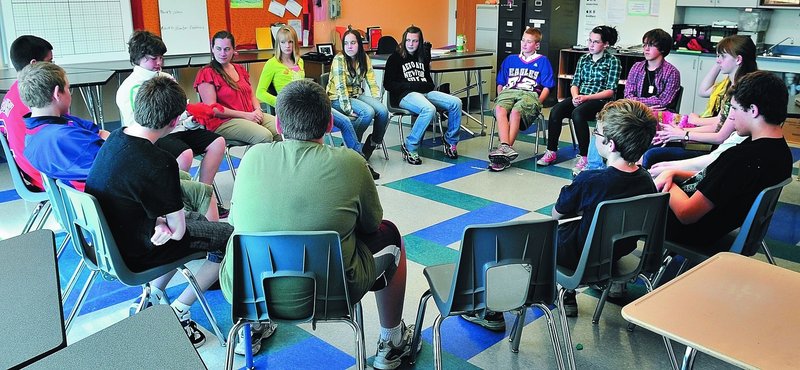A month into the school year, Winslow Junior High has yet to hand out a detention.
Language arts teacher Maryann Nyman said it’s a situation that’s unusual but not surprising. The school has seen a drop in detentions since it started taking a new approach to discipline more than three years ago.
Called “restorative justice,” the method obliges students to think about what they did to get in trouble, who they hurt in the process and how they could make up for it — all as a way to restore peace in the school community.
Rather than sitting in rooms staring at walls, students punished with detention have to talk to the people affected by their misbehavior and figure out the appropriate consequences.
“It’s just a way for them, not to get off the hook, but to be more responsible for their behavior,” Nyman said. “With raging hormones and all the problems junior high kids have, learning social skills is a big part of it.”
The shift in disciplinary practice is gaining momentum in Maine’s schools, some of which are reporting significant improvements in student behavior.
Barbara Blazej, coordinator of the Restorative Practices Collaborative of Maine, said the organization has worked with about a dozen schools since 2005, helping them change their approach to discipline.
Winslow and Waterville junior high schools are two of them. Bingham and South Portland schools are close to implementing the approach.
Blazej said a year of training, evaluation and support from the organization costs a school between $4,500 and $6,000.
Some schools, including Messalonskee Middle School, have taken training courses offered by the collaborative and started using restorative practices on their own. Because of that, Blazej isn’t sure how many schools have adopted the new approach.
“I have a sense it’s more widespread than we think,” she said.
Jon Moody, assistant principal of Messalonskee Middle School, said staff from Pittsfield and Vassalboro schools showed interest in the method at a presentation he gave in Waterville earlier this month. Moody showed them the hard evidence of the effect the change has had in Oakland.
Before the school started using restorative practices in 2008, he said, there were nearly 500 detentions and more than 300 suspensions a year, on average. Last year, those numbers had fallen by more than 50 percent.
Ashley Willoughby, a junior high school counselor in Waterville, said using the restorative approach had a different effect there. Though the total number of detentions didn’t drop, there was a sharp decline in serious offenses because there were fewer repeat offenders, she said.
In the 2007-2008 school year, before the school started using restorative justice, there were 302 suspensions. Last year, there were 92.
Despite the data, restorative justice has its critics. “There are some teachers who really believe that laying down the law and being more punitive is the way to handle kids,” said Nyman.
Willoughby said she believes that making students face those they’ve hurt is tougher punishment than making them sit for an hour with nothing to do.
“It can be an uncomfortable situation,” she said.
Teachers said some students don’t buy into the process; they go through the motions of apologizing but don’t mean it. Until they alter their attitude, Nyman and Willoughby said, they’ll continue to get into trouble.
Though it’s too early to tell what long-term effects the restorative approach could have, the educators who believe in it think it could be far-reaching.
The approach, they said, teaches kids about building relationships, caring for their community, managing behavior and feeling good about themselves.
“If we accomplish that in junior high, that’s pretty good,” Nyman said.
Send questions/comments to the editors.



Success. Please wait for the page to reload. If the page does not reload within 5 seconds, please refresh the page.
Enter your email and password to access comments.
Hi, to comment on stories you must . This profile is in addition to your subscription and website login.
Already have a commenting profile? .
Invalid username/password.
Please check your email to confirm and complete your registration.
Only subscribers are eligible to post comments. Please subscribe or login first for digital access. Here’s why.
Use the form below to reset your password. When you've submitted your account email, we will send an email with a reset code.